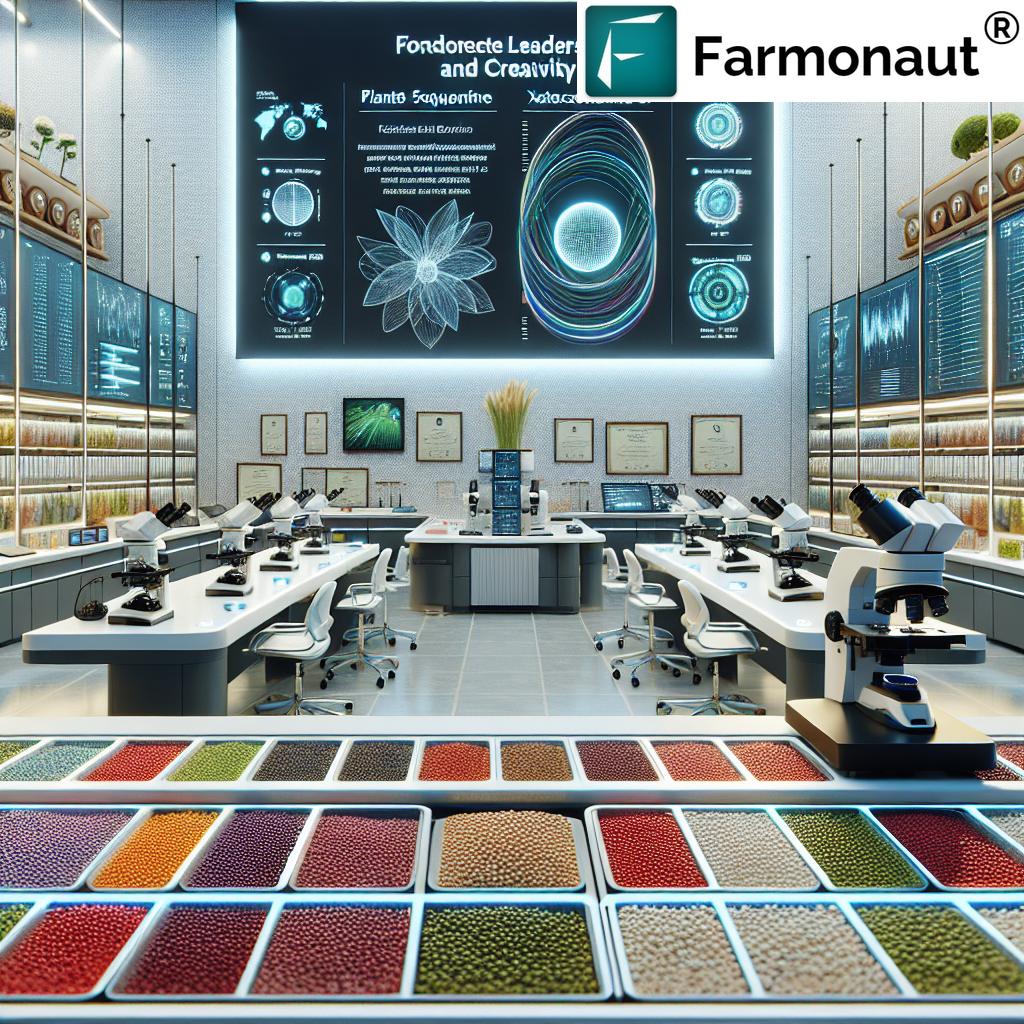Farmonaut: Revolutionizing Seed Industry Leadership with Cutting-Edge Agricultural Innovations
“Agricultural trade associations advocate for over 2 million farmers in the US, driving industry progress and policy development.”
In the ever-evolving landscape of agriculture, we at Farmonaut are witnessing a transformation that’s reshaping the very foundations of seed industry leadership and agricultural policy development. As we delve into the cutting-edge innovations and trends that are propelling our sector forward, we invite you to join us on a journey through the latest developments in crop innovation, plant breeding, and the critical role of agricultural trade associations in advocating for farmers worldwide.

The Evolving Landscape of Seed Industry Leadership
The seed industry stands at the forefront of agricultural innovation, driving progress through advanced research, policy advocacy, and technological breakthroughs. In recent years, we’ve observed a significant shift in industry leadership, with a renewed focus on sustainability, efficiency, and adaptability to global challenges.
- Emerging Leaders: A new generation of leaders is taking the helm, bringing fresh perspectives and innovative approaches to longstanding agricultural challenges.
- Collaborative Initiatives: Industry giants and startups alike are fostering partnerships to accelerate innovation and address global food security concerns.
- Policy Influence: Seed industry leaders are increasingly engaging with policymakers to shape agricultural policies that support sustainable practices and foster innovation.
As we navigate these changes, it’s crucial to recognize the pivotal role of agricultural trade associations in driving industry progress. These organizations serve as the voice of farmers and agribusinesses, advocating for policies that promote growth, sustainability, and innovation in the agricultural sector.
Plant Breeding Innovations: Shaping the Future of Agriculture
At the heart of agricultural advancement lies plant breeding innovation. This field has undergone a revolution in recent years, thanks to breakthroughs in genomics, biotechnology, and data analytics. Let’s explore some of the most impactful developments:
- CRISPR Gene Editing: This precise gene-editing tool is enabling breeders to develop crops with enhanced traits such as disease resistance and improved nutritional profiles.
- Speed Breeding: Advanced techniques are accelerating the breeding process, allowing for the development of new varieties in a fraction of the traditional time.
- AI-Driven Breeding: Artificial intelligence and machine learning algorithms are optimizing breeding programs, predicting trait combinations that lead to superior crop varieties.
These innovations are not just theoretical; they’re making a real-world impact. For instance, drought-resistant crop varieties developed through advanced breeding techniques are helping farmers in arid regions maintain productivity in the face of climate change.
Seed Treatment Technologies: Enhancing Crop Protection and Yield
“Seed treatment technologies have increased crop yields by up to 30% in certain regions, revolutionizing modern agriculture.”
Seed treatment technologies have emerged as a game-changer in modern agriculture, offering a targeted approach to crop protection that begins at the seed level. These innovative treatments are designed to safeguard seeds and young plants from pests, diseases, and environmental stresses, setting the stage for healthier, more productive crops.
- Biological Treatments: Leveraging beneficial microorganisms to enhance plant health and resist pathogens.
- Polymer Coatings: Advanced coatings that improve seed flowability and reduce dust-off during planting.
- Nutrient Enhancements: Treatments that deliver essential nutrients directly to the seed, promoting vigorous early growth.
The impact of these technologies on crop yields and farm productivity cannot be overstated. By providing early protection and nutrition, seed treatments are enabling farmers to maximize their yields while minimizing the need for additional inputs later in the growing season.

The Critical Role of Agricultural Trade Associations
Agricultural trade associations serve as the backbone of industry advocacy and progress. These organizations play a multifaceted role in shaping the future of agriculture:
- Policy Advocacy: Representing the interests of farmers and agribusinesses in policy discussions at national and international levels.
- Research Support: Funding and facilitating critical research initiatives that drive agricultural innovation.
- Industry Standards: Developing and promoting best practices and standards that enhance the quality and safety of agricultural products.
- Education and Outreach: Providing resources and training to help farmers adopt new technologies and practices.
The work of these associations is instrumental in navigating the complex challenges facing modern agriculture, from climate change to food security concerns. Their efforts ensure that the voices of farmers and industry stakeholders are heard in crucial policy debates.
Challenges and Opportunities in the AgTech Industry
The agtech industry is brimming with potential, but it also faces significant challenges as it seeks to revolutionize farming practices. Let’s explore some of the key issues and opportunities:
- Data Privacy and Security: As farming becomes increasingly data-driven, protecting sensitive information is paramount.
- Adoption Barriers: Overcoming resistance to new technologies among traditional farming communities.
- Regulatory Hurdles: Navigating complex regulatory landscapes for innovative agricultural products and practices.
- Sustainability Imperatives: Developing solutions that increase productivity while reducing environmental impact.
Despite these challenges, the opportunities for innovation in agtech are immense. From precision agriculture to blockchain-based supply chain solutions, technology is poised to transform every aspect of farming.
Conservation Practices in Modern Agriculture
As the agricultural industry evolves, there’s a growing emphasis on conservation practices that protect natural resources while maintaining productivity. These practices are becoming increasingly important in the face of climate change and environmental pressures:
- No-Till Farming: Minimizing soil disturbance to improve soil health and reduce erosion.
- Cover Cropping: Planting secondary crops to protect and enrich the soil between growing seasons.
- Precision Agriculture: Using technology to optimize resource use and reduce waste.
- Water Conservation: Implementing efficient irrigation systems and water management strategies.
These conservation practices not only benefit the environment but also contribute to long-term farm sustainability and profitability. As industry leaders, we’re committed to promoting and advancing these practices through education, policy support, and technological innovation.
Recognizing Excellence: Industry Awards and Honors
The agricultural sector regularly recognizes outstanding contributions and lifetime achievements through various awards and honors. These accolades serve to highlight exceptional leadership, innovation, and service within the industry:
- Distinguished Service Awards: Honoring individuals who have made significant contributions to agricultural advancement.
- Lifetime Achievement Recognition: Celebrating careers dedicated to improving the agricultural sector.
- Innovation Awards: Recognizing breakthrough technologies and practices that are shaping the future of farming.
These awards not only celebrate individual and organizational achievements but also serve to inspire the next generation of agricultural leaders and innovators.
The Future of Agricultural Policy Development
As we look to the future, agricultural policy development is poised to play a crucial role in shaping the industry landscape. Key areas of focus include:
- Sustainability Incentives: Policies that encourage and reward sustainable farming practices.
- Research Funding: Increased support for agricultural research and development initiatives.
- Trade Policies: Efforts to ensure fair and open markets for agricultural products globally.
- Climate Change Adaptation: Policies to help farmers adapt to and mitigate the impacts of climate change.
The development of these policies will require close collaboration between industry leaders, policymakers, and agricultural trade associations to ensure that they address the complex needs of the sector.
Farmonaut’s Role in Agricultural Innovation
At Farmonaut, we’re proud to be at the forefront of agricultural innovation, offering cutting-edge solutions that empower farmers and agribusinesses. Our platform leverages advanced technologies to provide valuable insights and tools for modern agriculture:
- Satellite-Based Crop Health Monitoring: Real-time insights into vegetation health and soil moisture levels.
- AI-Driven Advisory System: Personalized recommendations for crop management and resource optimization.
- Blockchain-Based Traceability: Ensuring transparency and trust in agricultural supply chains.
- Carbon Footprint Tracking: Helping agribusinesses monitor and reduce their environmental impact.
We invite you to explore our suite of tools and services designed to revolutionize farming practices and drive sustainable growth in the agricultural sector.
Discover Farmonaut’s innovative solutions:
For developers interested in integrating our technology:
Explore our API and API Developer Docs.
Agricultural Innovation Leadership Matrix
| Innovation Type | Industry Impact (1-5) | Sustainability Score (1-5) | Adoption Rate (%) | Key Industry Leaders | Policy Implications |
|---|---|---|---|---|---|
| Seed Treatment Technologies | 4 | 3 | 65% | Major seed companies | Regulations on chemical use |
| CRISPR Gene Editing | 5 | 4 | 30% | Biotech research institutions | GMO labeling laws |
| Precision Agriculture | 4 | 5 | 45% | AgTech startups, equipment manufacturers | Data privacy legislation |
| Conservation Tillage | 3 | 5 | 55% | Environmental NGOs, equipment manufacturers | Soil conservation incentives |
| Blockchain Traceability | 3 | 4 | 20% | Tech companies, food processors | Supply chain transparency regulations |
Conclusion: Embracing the Future of Agriculture
As we’ve explored throughout this article, the agricultural sector is undergoing a profound transformation, driven by technological innovation, policy developments, and a renewed focus on sustainability. From groundbreaking plant breeding techniques to advanced seed treatments and conservation practices, the industry is evolving to meet the challenges of feeding a growing global population while preserving our planet’s resources.
At Farmonaut, we’re committed to being at the forefront of this agricultural revolution, providing farmers and agribusinesses with the tools and insights they need to thrive in this new era. By embracing innovation, fostering collaboration, and advocating for supportive policies, we can create a more resilient, sustainable, and productive agricultural sector for generations to come.
We invite you to join us on this exciting journey. Whether you’re a farmer looking to optimize your operations, a policymaker seeking to understand the latest trends, or an innovator with a vision for the future of agriculture, there’s a place for you in shaping the next chapter of our industry’s story.
Farmonaut Subscriptions
Frequently Asked Questions
- What are the biggest challenges facing the seed industry today?
The seed industry faces challenges such as climate change adaptation, increasing regulatory hurdles, and the need for sustainable intensification of agriculture. - How are plant breeding innovations contributing to food security?
Plant breeding innovations are developing crops with improved yield, disease resistance, and nutritional content, directly contributing to global food security efforts. - What role do agricultural trade associations play in policy development?
Agricultural trade associations advocate for farmers’ interests, provide industry insights to policymakers, and help shape regulations that impact the agricultural sector. - How is technology changing the landscape of agriculture?
Technology is revolutionizing agriculture through precision farming techniques, AI-driven crop management, and data analytics for optimized decision-making. - What are some key conservation practices in modern agriculture?
Key conservation practices include no-till farming, cover cropping, precision agriculture for resource optimization, and advanced water management techniques.
Stay informed with the latest developments in agricultural innovation and industry leadership by following our updates and exploring the resources available through Farmonaut. Together, we can cultivate a brighter future for agriculture.







